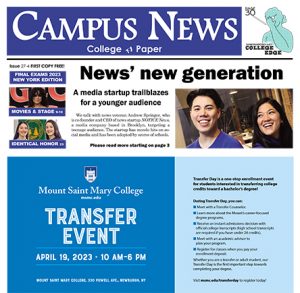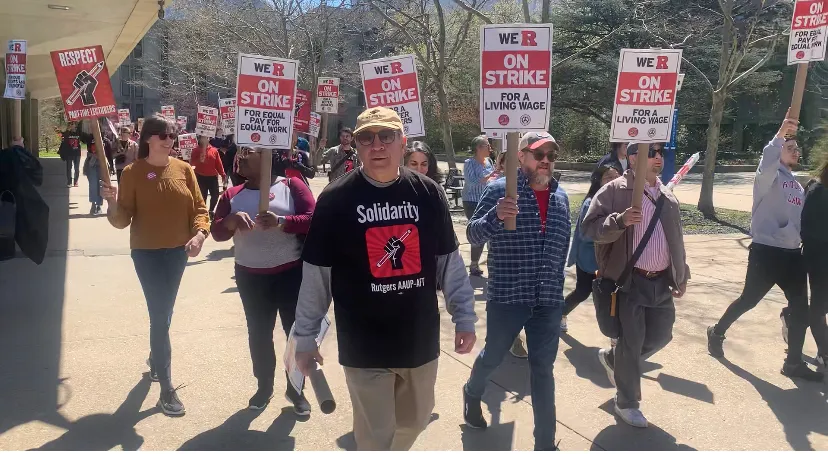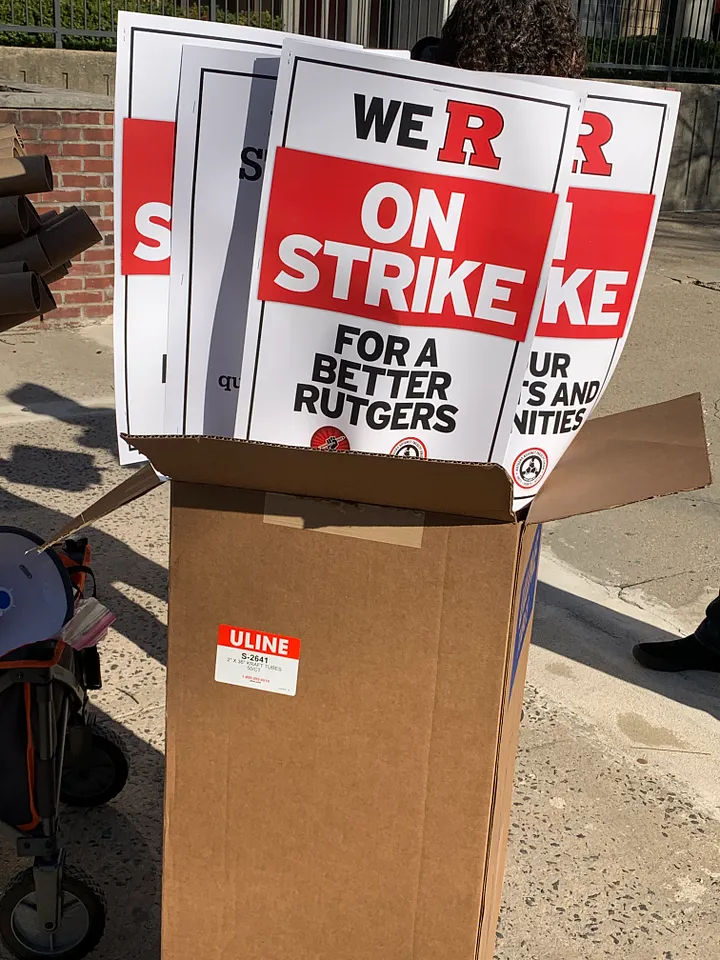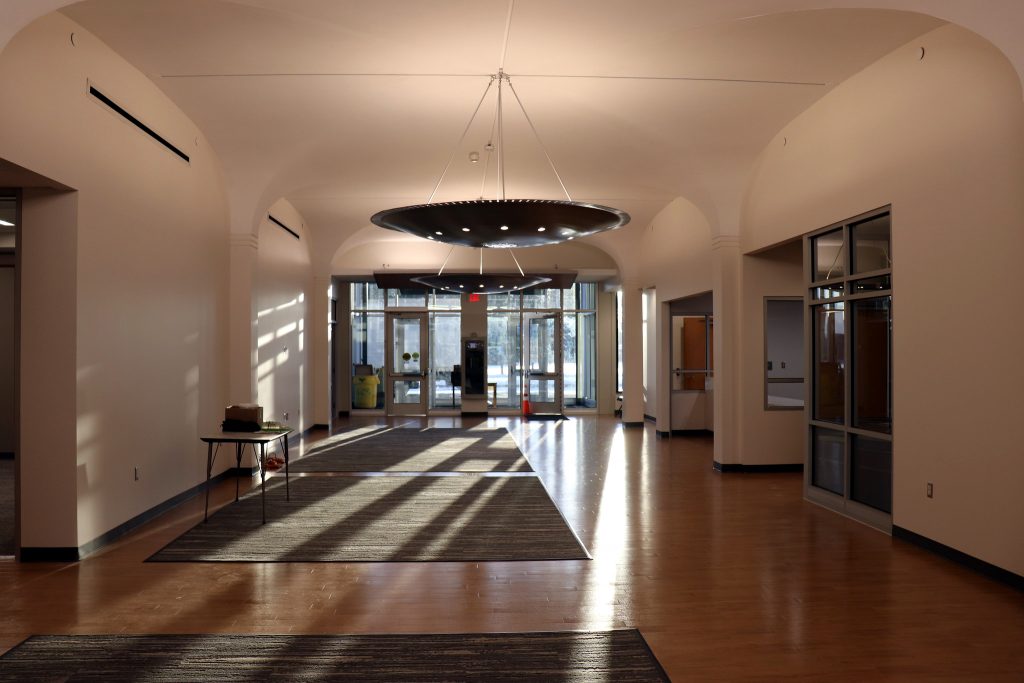By Larry Jaffee
Special to Campus News
This semester, Rutgers University is the ninth institution of higher learning that I’ve taught over a span of 16 years since the mid-1980s.
After 10 months of working without a contract and no signs from the administration that they would entertain substantial contract reforms, three Rutgers unions representing academic workers realized they were left with no choice but to withhold our labor.
Members overwhelmingly – 94 percent – voted yes to authorize a strike the first week of March. A month later – starting on April 10 – we formed pickets lines at all three campuses: New Brunswick, Newark, and Camden in what has become its teachers’ first strike in its 257 years.
Rutgers is the third such place where I’ve worked that part-time lecturers (PTL), referred to elsewhere as adjunct instructors or contingent faculty, have made noise about obtaining fair pay and better working conditions. But this time it’s different.

There’s true solidarity and respect from our far better-paid full-time tenured (FTT) colleagues, who at Rutgers comprise 70 percent of the faculty, which runs against the national trend, where the percentage is usually flipped in favor of adjuncts. Every place else I’ve worked the full-timers viewed us with disdain, as if we were only there to take their jobs or teach the large intro classes.
But at Rutgers, the Association of American University Professors (AAUP) and American Federation of Teachers (AFT) unions representing full-time professors representing not only PTLs but also and graduate students who teach or work as teaching assistants, as well as medical professionals. They joined forces as a united front with the knowledge that there is strength in numbers. It’s also a moral stroke.
Last year, I worked with the Service Employees International Union (SEIU) leadership at Mercy College to help win a fair contract. But the full-time professors, who are not unionized, were silent, on the matter. That was certainly a missed opportunity that likely would have improved their own compensation.
At New York Institute of Technology (NYIT), where I was on the faculty for a decade until this past December and received the 2021 Presidential Award for Excellence in Part-Time Teaching, it took two years before they allowed me and a colleague to join their union. By the AAUP chapter’s own admission, there was nothing in the contract for adjuncts. After a year clamoring to be let in, the union relented, perhaps realizing that to continue to deny us only would strengthen our complaint of an unfair labor practice at the National Labor Relations Board.
The national AAUP’s claim of “One Faculty One Union” representing the interests of all instructors in the classroom was and is a farce at NYIT. Then the pandemic hit, and NYIT conveniently pleaded poverty about losses of $30 million due to low enrollment, substantially reducing its adjunct labor force, which taught two-thirds of the classes. Adjuncts received a slight raise in the fall of 2021, but my course-load per semester was reduced from three classes to one. My department, Communication Arts, then was killed, among others including hospitality and the business school undergraduate program. Well done, NYIT, that’s one way to defuse a union-organizing effort.
When the Covid lockdown began in April 2020, all faculty were told by our collective administrations to jump, and we were expected to ask, “How high?” In the interim, they pared down their reliance on adjuncts, a readily available, cheap labor workforce who come a dime a dozen. Instead of addressing post-pandemic inequity among its ranks, for this latest contract negotiation, Rutgers & Co. has offered nominal compensation increases. Yet most higher education institutions – including Rutgers – enjoy the tax-free benefits of being a non-profit organization, and receiving $20 million annually from New Jersey, makes its hard line even more insidious.
Another major difference between the “public” Rutgers and my union experiences at NYIT and Mercy, both private institutions, is that Rutgers, apparently is flush with cash, both from balance sheet and endowment perspectives.
 Colleges and universities have long deployed a divide-and-conquer strategy, pitting its employees against each other, paying part-time faculty roughly a quarter of what full-timers get for the same work. At Marywood University in Scranton, Penn., last year I taught remotely a sports reporting class that paid me after taxes a total of $1,758 for four months of work. Thankfully, Rutgers pays better even under the old contract, but it’s still not enough.
Colleges and universities have long deployed a divide-and-conquer strategy, pitting its employees against each other, paying part-time faculty roughly a quarter of what full-timers get for the same work. At Marywood University in Scranton, Penn., last year I taught remotely a sports reporting class that paid me after taxes a total of $1,758 for four months of work. Thankfully, Rutgers pays better even under the old contract, but it’s still not enough.
Equal pay for equal work has been a main demand from the Rutgers unions, as well as increased job security, so we won’t have to apply for the same positions semester to semester. The unions realized during last week’s negotiations that the university wasn’t going to budge on that issue and others, leaving us with no choice but to strike.
Around 8:35 p.m. on Easter, union leaders told its members via Zoom we’re striking the next morning.
Bryan Sachs, vice president of Rutgers’ part-time lecturer union and chair of its bargaining committee, reported he endured more than 10 months of sitting opposite “an obstinate” and “uncaring” administration. When its negotiators would return a union ask on the behalf of contingent faculty, grad workers and post-docs, Sachs said they typically “just strike through the entirety of the proposal.” After spending so much time in their presence, he believed “they’re simply not interested in achieving a deal.”
Several hours into the first day of our strike on the thee campuses, Governor Phil Murphy finally managed to get both sides to Trenton to hammer out their differences with mediation help. Hopefully, it will produce the results we deserve.
Strike Update No. 1: The Rutgers president and unions announced at 12:40 am on April 16 that an agreement over a “framework” on new contracts by the two sides was reached and that strike was “suspended.” Teaching faculty were told by the unions to return to classroom, Monday, April 18. From a part-time lecturer, major strides were reached. Under the framework, if finalized, my own salary will increase from currently $5,800 per course to $7,530, 30 percent increase, as well as a retroactive lump sum for the first year of the contract – after the agreement is ratified – because the last collective bargaining agreement expired on June 30 2022. PTL per course compensation increases for Year Two to $7,775, Year Three to $8,331 by Year Four. While adjuncts didn’t achieve everything we sought (e.g., health insurance and exact “equal pay for equal work,” meaning the same as full-time professors), we made substantial strides in terms of job security, such as appointments based on seniority. No doubt the unions were pressured to take the deal, and if the strike continued any money promised by Gov. Murphy would evaporate, and the administration was nearly certain to seek a court order injunction that would declare the walkout illegal, facing criminal penalties, including fines and potential jail. The unions point out that a suspension of the strike is not a cancellation. “Crucial outstanding articles addressing core issues that have not yet been tentatively agreed to between the unions and management, and so bargaining and the fight continues.” If the unions do not secure the gains “we need on the open issues through bargaining in the coming days, we can and will resume our work stoppage.” In addition, Biomedical and Health Sciences faculty in AAUP-BHSNJ have a lot of open items specific to them within our new unified contract, and graduate workers do as well.”
Update No. 2 (May 1): The suspension of the strike April 10-17 two weeks later resulted in Rutgers President Jonathan Holloway announcing “a tentative agreement” (TA) on new contracts has been reached on April 30 in an email at 7:31 p.m. between the university and its faculty unions, whose membership must ratify the deal. According to the administration, the TAs provide “substantial salary increases” for its faculty covering 9,000 educators, researchers, and clinicians, as well as retroactive raises for the work done since June 30, 2022 when the previous contract expired. About an hour later those unions emailed its members that the Rutgers AAUP-AFT Executive Council (representing full-time professionals and grad students), the Rutgers Adjunct Faculty Union, and the AAUP-BHSNJ Council (representing the university’s medical school and health professionals) indeed voted to approve and recommend ratification of Tentative Agreements (TA) for contracts tomorrow (May 1). Both Holloway and the unions commended Gov. Phil Murphy for helping to facilitate negotiations once a bargaining impasse caused the unions to call the strike, the first in the University's 257-year history and New Jersey's largest public-sector work stoppage. “When the TAs are finalized and signed off by both our unions and the university, we will share the complete text with members,” the union email stated, in contrast to Holloway, who made it seem like it was a done deal dependent on ratification. Regarding compensation, the unions didn’t use the word “substantial,” though it acknowledged the salary increases. It's interesting to note, “We’re proud of what we achieved by going on strike and joining together for the Rutgers we and our students deserve,” the unions stated. “We believe these are strong contracts that make numerous advances for our members. We didn’t win everything we asked for and deserve, but no labor contract ever does. We will continue fighting for a better Rutgers starting the day after we have a ratified contract.” Each of the three unions must individually oversee the ratification votes. Through the week, the unions are planning a series of virtual Town Halls with the ratification vote planned for May 8. There’s no reason to believe the TAs won’t be finalized, but Holloway’s announcement presented the information as it was a done deal awaiting ratification. the faculty, whether or not they’re union members, will receive increases. Regarding salary, Part-Time Lecturers (PTL) like myself jump from $5,799 a course to $7,530 a course next semester, followed by incremental increases to $8,331 by year 4. However, this was far short of the “Equal Work Equal Pay” that would put us on par with our tenured full-time professor colleagues. Nor did we receive any healthcare, another goal of the adjunct instructors, who will now be known as “Lecturers” under the new contract. If a TA was not reached by May 2, the University Senate was poised to take a vote of no confidence” in Holloway.After the strike was suspended, activist graduate students, in particular, were upset that the mass walkout did not continue, as numerous issues impacting all the unions remained undecided, especially those impacting the medical school.
 Larry Jaffee (https://larryjaffee.com) has taught journalism and writing on the college level since the mid-1980s. At the New York Institute of Technology, where he taught for a decade, Jaffee received the 2021 Presidential Award for Excellence in Part-Time Teaching. In 2016, Jaffee founded and advised the NYIT student newspaper the Manhattan Globe, which won awards from the Society of Collegiate Journalists and Fair Media Council in 2021. Soon after graduating from Hofstra University, Jaffee wrote regularly for The New York Times on social issues and was published in Rolling Stone, among other publications. From 2010-2020, Jaffee wrote about cybersecurity for SC magazine and scooped the Washington Post on the 2016 Presidential Election hack of the Democratic National Committee. More recently, Jaffee has focused on writing about the music business and is the author of Record Store Day: The Most Improbable Comeback of the 21st Century (Rare Bird Books, Los Angeles).
Larry Jaffee (https://larryjaffee.com) has taught journalism and writing on the college level since the mid-1980s. At the New York Institute of Technology, where he taught for a decade, Jaffee received the 2021 Presidential Award for Excellence in Part-Time Teaching. In 2016, Jaffee founded and advised the NYIT student newspaper the Manhattan Globe, which won awards from the Society of Collegiate Journalists and Fair Media Council in 2021. Soon after graduating from Hofstra University, Jaffee wrote regularly for The New York Times on social issues and was published in Rolling Stone, among other publications. From 2010-2020, Jaffee wrote about cybersecurity for SC magazine and scooped the Washington Post on the 2016 Presidential Election hack of the Democratic National Committee. More recently, Jaffee has focused on writing about the music business and is the author of Record Store Day: The Most Improbable Comeback of the 21st Century (Rare Bird Books, Los Angeles).








Facebook Comments